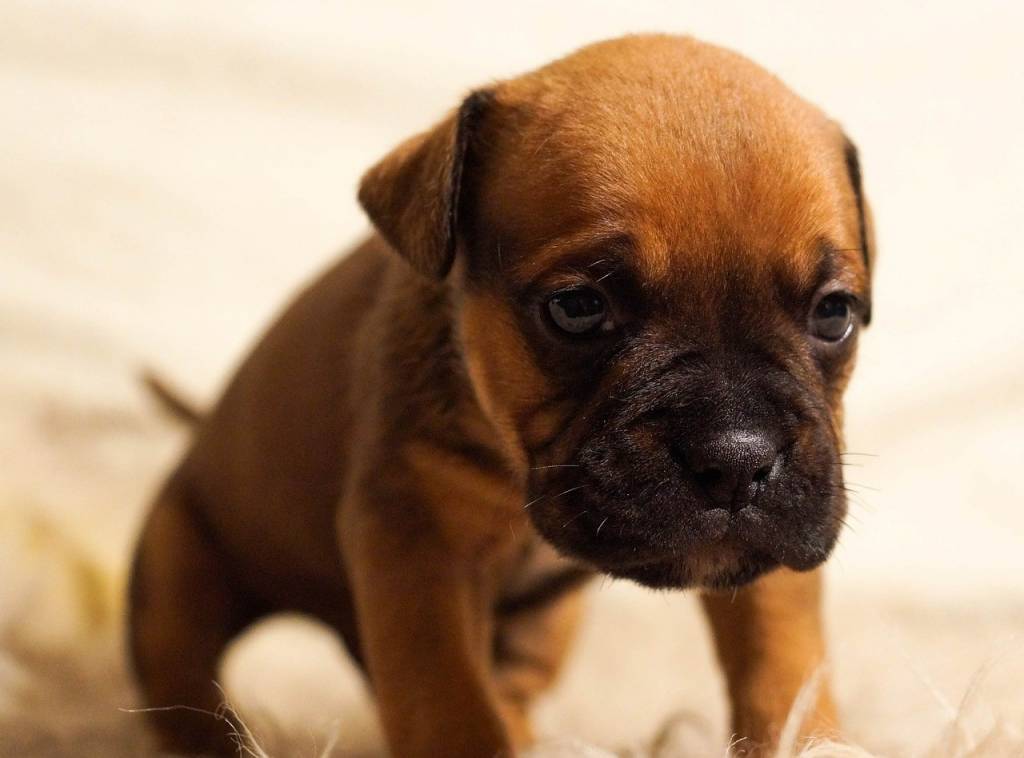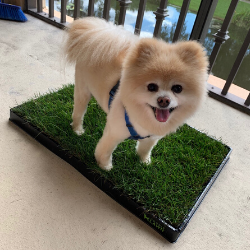Why is My Puppy Peeing a Lot?
For a puppy, the first weeks of life can be overwhelming. After all, they are tiny things in this big scary world, and they are seeing it all for the first time. You can’t expect your fur baby to know everything in the beginning. A few mistakes will be made.
A puddle on the floor here and there is nothing new to a puppy parent. It may seem impossible that something so little can urinate that much, but it’s important to understand why this is happening in order to prevent it in the future.
Puppy Peeing Non-Stop? Get a Schedule.
Dogs love having a routine, and it’s important to start early with your pup to enforce one. Create a potty schedule that will become instinctual with them.
Usually, your fur baby will need to go outside 30 minutes after drinking water. That's one of the best carpet-saving tips I've learned from my favorite dog trainer.
You may be taking your puppy out too much if they are peeing a lot. It may seem logical at first to take them out right after they wake up, drink water, have lots of playtime, or come out of a crate, but that isn’t the case.
Taking your pup out at the same time everyday, the same way, creates a routine. This way, they will be less likely to pee on the floor or feel as if they have to empty their bladders whenever it feels full. They’ll learn how to hold that pup-pee in.
Make Sure a Medical Issue Isn't Causing Your Puppy to Pee Too Frequently
Before getting frustrated with your dog for going more often than they should, contact your vet to make sure that all is well. A urinary tract infection could be the cause of your pup’s frequent urination. This is a broad-spectrum condition that carries a rather wide range of severity, so it’s in your best interest to act on it right away if you’re the least bit suspicious of the condition.
For example, a UTI could be symptomatic of diabetes. The most common form of diabetes is similar to the human version of the condition, in that there’s a deficiency in the way your pup produces insulin. However, there is also a rarer version of the condition called diabetes insipidus, which is caused by a hormonal issue.
To determine if that is the case, your vet will take a urine sample and do some blood work. Antibiotics or other medications and supplements may be needed for treatment. In some cases, your pup will receive treatment of the underlying condition causing a UTI in addition to receiving treatment for the UTI itself.
You may want to be on the lookout for signs beyond peeing frequently to help you determine if there’s a potential urinary tract problem afoot. For instance, you may want to examine the pee for various signs of funkiness, such as cloudiness or an unusually strong odor. It’s a dirty job, sure, but nobody ever said that dog ownership was a bastion of cleanliness.
Your pup may also exhibit physical symptoms that could be interpreted as a red UTI flag. Some of these signs seem directly correlated to the issue, such as yelping in pain when trying to go pee or frequently licking the opening where pee emits. Other signs are a little more abstract in nature, such as vomiting or fever.
If you’re worried that your pup’s peeing problem isn’t just behavioral, play it safe. A vet is your best bet for getting to the bottom of your doggy woes. Even if there is nothing wrong, you will at least be granted peace of mind, which is something that could be greatly needed.
Behavioral Problems

Some puppies over 3 months will pee to mark items. This can be caused by a social trigger (like trying to impress a female dog) or a new place, or it can happen because the dog hasn’t been spayed or neutered.
Pups can pee when they are feeling anxious. If your puppy if feeling upset every time you leave, they may be experiencing separation anxiety. Leaving them in a comfortable spot, like a crate, can help reduce stress and anxiety when you leave the house.
Your pup could also be peeing often because they are feeling excited or submissive. Submissive peeing is normal for dogs to show that they aren’t a threat to you. They will often lie on their backs and show you their tummies.
Excited pups may pee just because they are happy to see you, but plenty of other things can cause excited peeing: going on a walk, meeting a new furry pal, or even being rewarded with a favorite treat.
The trick is to be quicker than the pup’s reaction. When you come home, take them out right away, or take them outside as they begin to get excited.
And contrary to what some people may think, there is no such thing as spiteful urination. While it may look like your pup is sending you some sort of soggy ultimatum at times, what you are most likely seeing in these cases is a combination of submissive pee and a genuine need to urinate. Remember, your pup’s reactions are based on a need to try and please you, particularly if you have made it clear to him that you are the alpha dog in your relationship.
Here's a great video on potty training your pup:
Watch their Water Bowls
It’s important not to leave their water bowls out all day. Fill up the appropriate amount of water for your dog and pick it up after they are done drinking. Remember: your pup will want to pee about 30 minutes after filling up the tank.
Give your dog water at meal times. This way, your dog will develop a firm expectation of when the wet stuff will arrive. You’ll also be creating a routine for effective housebreaking.
So, how much water should you be giving your dog every day? According to veterinarians, a dog should be drinking about 1/4 to 1/3 of a cup of water per pound per day. If you have a scale at home, you may be able to track your pup’s weight periodically to make sure his water intake is falling within those parameters.
Let your puppy go outside one more time after dinner, and then make sure they are water-free for the rest of the night. You’ll want to cut off their water intake roughly 2 1/2 hours before it’s time for bed. Also, take them out roughly 2 to 3 hours before bedtime to further avoid the danger of stepping in any puddles in the morning.
Your Puppy and the Sleep Cycle
Typically, a puppy will be able to sleep up to seven hours before the urge to go pee strikes, which is more or less the same amount of slumber you’ll get. Because of this, you should be able to sync his bedtime water and pee routine with the last couple hours of your own evening ritual.
However, this is not necessarily a perfect, iron-clad system - a puppy may occasionally have to go potty in middle of the night, just because his mechanics are still developing.
If your four-legged friend starts yelping at you so he can be let out at night, it’s important that you allow him to do his business as efficiently as possible. Simply get him outside so he can do his business and bring him right back inside so he can get back to sleep.
If you start engaging him in a playful manner, he may get the message that it’s perfectly okay to wake you up in the middle of the night for playtime, which is something you want to avoid at all costs.
Great solution for:
- Apartments / no backyard;
- Housetraining puppies and adult dogs;
- Traveling with pets (hotels, boats, planes);
- Puppies during vaccination periods;
- Harsh weather outside (hurricanes, blizzards, heavy snow, etc.);
- Busy owners;
- Pet parents who have difficulty getting a dog outside;
- Old and arthritic dogs.
Help the Pup Learn
Puppies under 3 months old do not have the ability to hold in their urine. Their bladders have not developed yet. So if your young puppy needs frequent potty breaks, never fear! This will change through time and training.
It’s important to establish where the puppy should go potty. If you have a yard, designate an area where the pup will relieve themselves. Bring them out to this spot every time they go outside.
Get to know your pup. Does your dog pee only when you’re not looking? Or when you come home from work after they were left alone for hours? Or do they simply not care? Can they pee anytime, anywhere? Getting to know when they want to pee will help establish a routine.
If the frequent urination is symptomatic of an overarching behavioral problem, such as separation anxiety or submissive peeing, you will have to put a little extra elbow grease into your training.
Though not rocket science, dog training isn't always exactly intuitive either. That's why I'm so glad I got some help early on to show me the way and skip the learning curve...
While putting a cap on water intake and establishing a routine potty break schedule will help teach your four-legged friend that piddling outside is the right thing to do, stopping behavioral-related peeing requires you to work with your pup to overcome the psychological trigger that results in unwanted puddles.
There are several different, gentle training techniques that you can deploy to help your pooch overcome these psychological triggers, and you can utilize these techniques while you train your pooch to pee properly.
For instance, let’s say your puppy has a problem with letting the pee fly because he’s so excited and happy to see you when you get home from work, the grocery store, or even a quick 2-minute jaunt to your garage.
In this case, the proper training technique is to not scold him for piddling; rather it’s wise to not engage him, because doing so will signal to him that how he is reacting is perfectly okay. Eventually, when you repeat this tactic, your dog will lose interest in the overall process and remain calm when you return from wherever it is you’re coming from.
Above all else, as you go through the potty-training process, keep whatever frustrations that may crop up on your end in check.
Remember, your pup isn’t peeing all over the place to spite you or to be a jerk - he’s just a puppy that doesn’t know any better. What’s more, if you’re firmly establishing that you are the alpha in the house, he will respect that and want to please you.
Yes, it can be quite frustrating if you find yourself having to constantly clean up your puppy’s messes during training. But be sure you go about training him from a loving spot, making your admonishments firm yet kind and giving him praise and rewards when he does get things right.
Once you get through this training, the random puddles of puppy pee will feel like a distant memory.
Here's a good roadmap to gauge your puppy's potty-training readiness:




